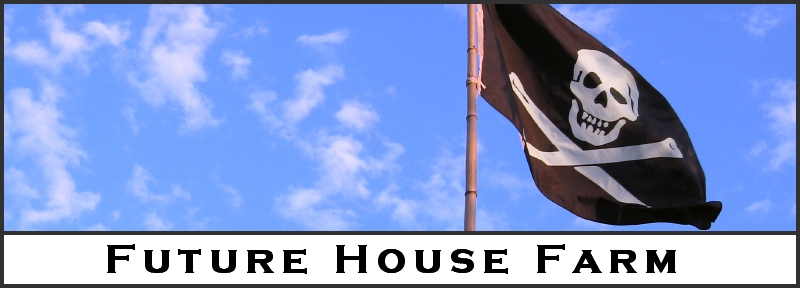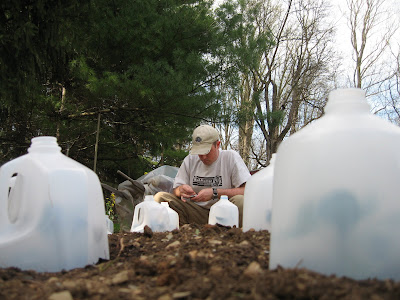Our brassicas have found their way into the garden. In the bed at the top of the photo we have six broccoli and six white cabbage and in the bed at the lower portion of the photo we have six Brussels sprouts and six red cabbages. We grouped them together like this for both protection and production purposes. If we can, I think we may try to squeeze some sage in there as well. We'll see.
Last year cabbage worms destroyed our brassicas, leaving very little for us to actually harvest. This year we purchased floating row covers to keep out the moths that lay the eggs that eventually become the kraut eatin' worms. From what we've read in books and heard at the farmer's market, row covers are extremely effective. However there is one set back and that is they also keep out beneficial insects that are necessary for pollination with some plants.
Luckily brassicas don't need to be pollinated to produce the goods. We figured that if we kept all the brassica beds free of plants that need pollinating we wouldn't need to worry. ( I know, we're doing rocket science over here.) Sage is also a deterrent of cabbage moths so we may plant some of it around the edges to discourage any insect sneakiness.
Another bit or protection we are looking for is against the elements. Although we hardened our plants off, we wanted to play it safe in case there were any surprise temperature drops in the next couple of days. Since the end of last year's growing season, Meg's parents have been saving water and milk jugs for us so we could carve them into cloches.
After we finished planting and had a little lunch, I set to work with our trusty utility knife and cut the bottoms off of twenty four jugs. It is now three days later and they are doing awesome. Our average lows at night have been around 38°. We figure that by Thursday the plants should be completely hardened off and we can remove the cloches and save them for our tomatoes and peppers.
15 April 2008
Brassicas and Homemade Cloches
Labels:
brassicas,
companion planting,
pests,
recycle,
row covers
Subscribe to:
Post Comments (Atom)






9 comments:
Your brassicas look terrific! Glad the milk/water jugs are helping, too. When do you have to put the row covers over the plants?
The cartons are a brilliant idea. Thanks for sharing.
Boy, Meg's parents drink mucho milk and bottled water. haha
How useful to resuse and recycle like that. I had no idea what cloches were before today! Thank you for teaching me some very cool new things.
Your garden is looking great. I hope the chilly weather stays away....and the worms, too.
Getting your brassicas into the garden as early as possible helps control cabbage worms. It gives you a head start before there are many butterflies.
The plants look great!
The row covers work wonderfully! They work good on the squash/pumpkins too. Keep the borers, squash bugs and cucumber beetles off unti lthe plants get well established and don't succumb as easily. Life savers, those covers.
Those look great. (Both the plants and the cloches.) Here's hoping you end up with a glut of brassicas in a couple of months.
Better luck with the brassicas this year. I am attempting them for the first time this year. Thank you for sharing your experiences with them.
It's great to see someone else recycling too!! I use all my water bottles as a deep water irrigation system. Details on my blog! Great post!!
Laurel,
The cloches only have to be on for a few days to assist with the hardening off process. Afterwards we'll save them for the squash, peppers, and tomatoes.
Gardeness,
Thanks, we're glad you enjoyed it.
Nancy,
Thank you. It's common around here to use what some would consider trash as a vital part of the gardening experience.
Twinville,
Laurel (Meg's mom) has mad connections and Mick (her dad) apparently drinks a great deal of milk.
Robin,
The cabbage moths are already out. It's not too bad, just a few here and there.
Angie,
I don't know if we'll use the covers on our squash, but we have our fingers crossed for the success of our brassicas.
Jenny,
Many thanks.
Rick,
No problem and good luck. Let us know how you fare.
Lets plant,
That's a great idea. We'll be sure to stop by and read up on your plans. Thanks.
Post a Comment